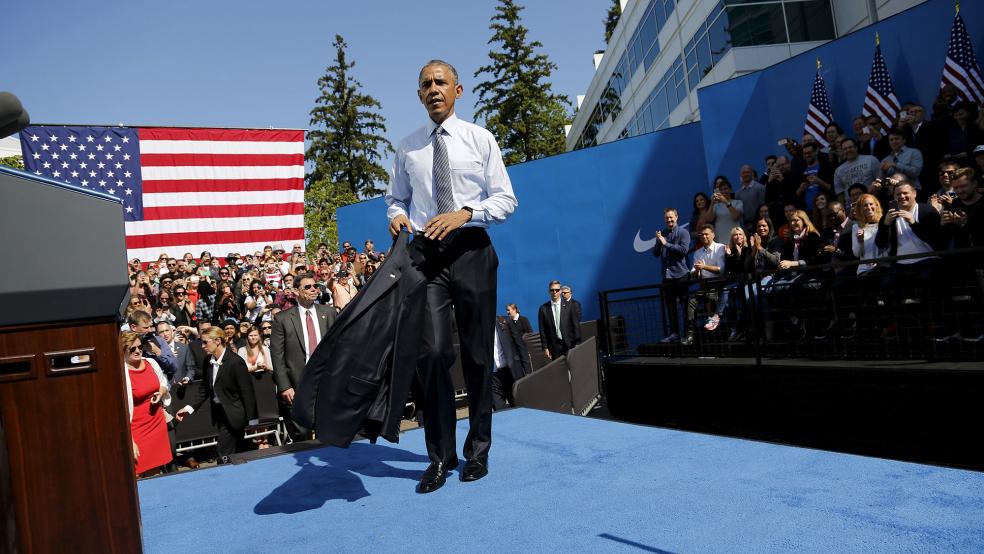As sparring among Democrats in Congress over the Trans-Pacific Partnership trade deal heats up, President Obama on Friday dropped the angry tone that he’s used recently in going after critics of the huge pact.
In a speech delivered at the Beaverton, Ore., headquarters of athletic apparel giant Nike, he opted for a more subdued approach, making the case that the deal involving major trading partners in the Pacific region would be good for both American businesses and workers.
The more immediate question is not approval of the trade deal, but rather Congress’s willingness to grant the president trade promotion authority. TPA, as it’s known, would allow the president to deliver a completed deal to Congress for an up-or-down vote, with no amendments possible.
Related: An Angry Obama Blasts Democrats on Trade Deal
The up-or-down vote gives the administration much more bargaining power with the other parties to the deal because it allows negotiators to promise that there will be no Congressional meddling to change the terms after the talks are completed.
However, in a deal as wide ranging as this one, covering everything from agricultural products to generic drugs and involving a dozen nations, many members of Congress on both sides of the aisle are wary of giving the president a free hand. And on the Democratic side in particular, critics of the deal have made it clear that they want to scour the text for giveaways to Big Business at the expense of workers.
Some even criticized Obama’s decision to deliver his speech at Nike headquarters.
“Nike epitomizes why disastrous unfettered free-trade policies during the past four decades have failed American workers, eroded our manufacturing base and increased income and wealth inequality in this country,” wrote Bernie Sanders, the left-wing senator from Vermont who is seeking the Democratic nomination for president.
Related: Boehner to Obama – Trade Votes Are Your Problem
On Friday, the president pushed back, if gently, against the idea that the deal would hurt workers.
“It’s the highest-standard, most progressive trade deal in history,” he told an audience of Nile employees. “It’s got strong, enforceable provisions for workers, preventing things like child labor. It’s got strong, enforceable provisions on the environment.”
Obama addressed concerns that the deal would send more U.S. jobs overseas by arguing that it forces America’s cut-price competitors to raise their standards – meaning that doing business in other countries would become more expensive, not cheaper.
“If any of the other countries in this trade agreement don’t meet these requirements, they’ll face meaningful consequences,” he said. “If you’re a country that wants in to this agreement, you need to meet higher standards. If you don’t, you’re out. If you break the rules, there are actual repercussions, and that’s good for American businesses and American workers because we already meet higher standards than most of the rest of the world.”
He conceded that he is at odds with a lot of members of his party over the trade deal. “They’re like…whuppin’ on me,” he said. But instead of criticizing them as he has in other recent speeches, he described them as “dear friends” and said, “They’re wrong.”
Related: Fast-Track Trade Deal Is on a Fast Track to Nowhere
Meanwhile, the White House was pushing the deal on social media, with the hashtag #LeadonTrade, sending out endorsements and fact sheets meant to sway public opinion in the president’s direction.
7 former SecDefs, 10 retired 4-stars encourage Congress to pass the TPA in public letter: http://t.co/KfrB9Gj4hy. #LeadOnTrade
— WH National Security (@NSCPress) May 8, 2015
But for all the administration’s efforts, the path forward on the bill isn’t clear.
Senator John Cornyn (R-TX), the GOP whip, said Republicans in the Senate would need 15 Democrats to vote with them in order to get the deal through the Senate.
The House remains an even bigger challenge. Speaker John Boehner (R-OH) has consistently said that he will not be able to get the bill through with only Republican votes but has denied any responsibility for securing them, making it clear that in his view, that’s President Obama’s problem.
Top Reads from The Fiscal Times





